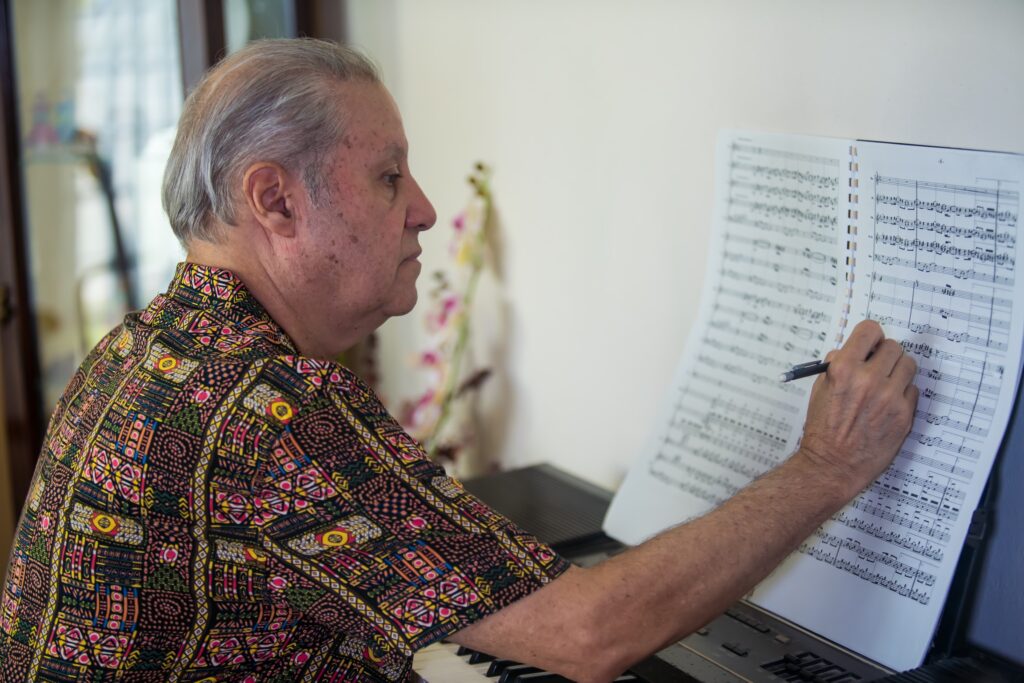
Puerto Rican composer William Ortiz-Alvarado was raised and educated in the United States, but his Latino identity plays a vital role in his music. Particularly, his experience as a Nuyorican in the 1970’s has informed the aesthetics of his music, which transforms the sounds of the streets into art music. Unique in that respect is the use of what Ortiz calls “sonic and vocalized graffiti”, that are integrated in Ortiz’ instrumental narrative.
His musical studies began at the Conservatory of Music of Puerto Rico where he studied composition with Héctor Campos Parsi. He received a master’s degree in composition from the State University of New York at Stony Brook, where he studied with Billy Jim Layton and Bülent Arel and a Ph.D. in music composition from S.U.N.Y. at Buffalo, studying with Lejaren Hiller and Morton Feldman.
Within the last four decades, Ortiz has written over 150 compositions in all genres and for all types of musical instruments; from simple percussion to opera, from chamber to orchestral works.
Among his numerous awards, grants and commissions is the Marquis’ Life Time Achievement Award, 2018; The Unesco Cultural Recognition for Music, 2015; 2001 Latin Grammy Nomination for the Baja California Orchestra’s CD “Tango mata danzón mata tango”, which includes his Guitar Concerto”Tropicalización“. The doctoral dissertations “The Percussion Music of Puerto Rican Composer William Ortiz” by Prof. Ricardo Coelho de Souza and “The Influence of Salsa in the Cello Works of William Ortiz” by Paula Santacruz, Ph.D. have been published.
Ortiz is a retired full professor of music and humanities and Director of the University Concert Band at the University of Puerto Rico at Bayamón. He has taught at the Conservatory of Music of Puerto Rico and is Music Director of the Ateneo Puertorriqueño.
He makes the following statement on his music: “I conceive of music as the ‘vibrant beauty’ of urban life; as the expressions of the cries and shouts of the street – cries and shouts that reflect the thoughts of those who are oppressed, of those who feel. It is my intent to convert the language of the street into a legitimate instrument”.
El compositor William Ortiz Alvarado fue criado y educado en los Estados Unidos, pero su identidad latina juega un papel vital en su música. Nació en Salinas, Puerto Rico tras estudiar composición con el maestro Héctor Campos Parsi en el Conservatorio de Música de Puerto Rico, recibe el grado de maestría de la Universidad de Stony Brook y luego el doctorado en composición de la Universidad del Estado de Nueva York en Buffalo, donde estudió con Lejaren Hiller y Morton Feldman. Fue catedrático en la Universidad de Puerto Rico en Bayamón donde dirigió la Banda Institucional por treinta años. Actualmente se desempeña como director de la sección de música del Ateneo Puertorriqueño.
Entre sus numerosas comisiones y premios recibidos se encuentran el Marquis’ Life Time Achievement Award, 2018; el Reconocimiento del Centro Unesco de Cultura, 2015; la nominación al premio Grammy Latino de 2001 por su obra “Tropicalización” como parte del CD “Tango mata danzón mata tango” de la Orquesta de Baja California; comisión para el Festival Casals de 1995; Premio de Música 1989 otorgado por el Ateneo Puertorriqueño; participó en el ISCM World Music Days de 1981 en Bruselas con su obra “124 East 107th Street“, que a la vez recibió el “Premio Felipe Gutiérrez Espinosa” del Bienal de Música Contemporánea, San Juan,1980.
Las disertaciones: “The Percussion Music of Puerto Rican Composer William Ortiz” por el Prof. Ricardo A. Coelho de Souza, y “The Influence of Salsa in the Cello Works of William Ortiz” por Paula Santacruz, Ph.D., han sido publicados.
El propio compositor nos dice lo siguiente en relación a su música:
“Yo concibo mi música como la ‘belleza vibrante’ de la vida urbana; como la expresión de los gritos y llantos de la calles – que reflejan los pensamientos de esos que sienten, de esos que están oprimidos. Es mi intento convertir el lenguaje de la calle en un instrumento legítimo“